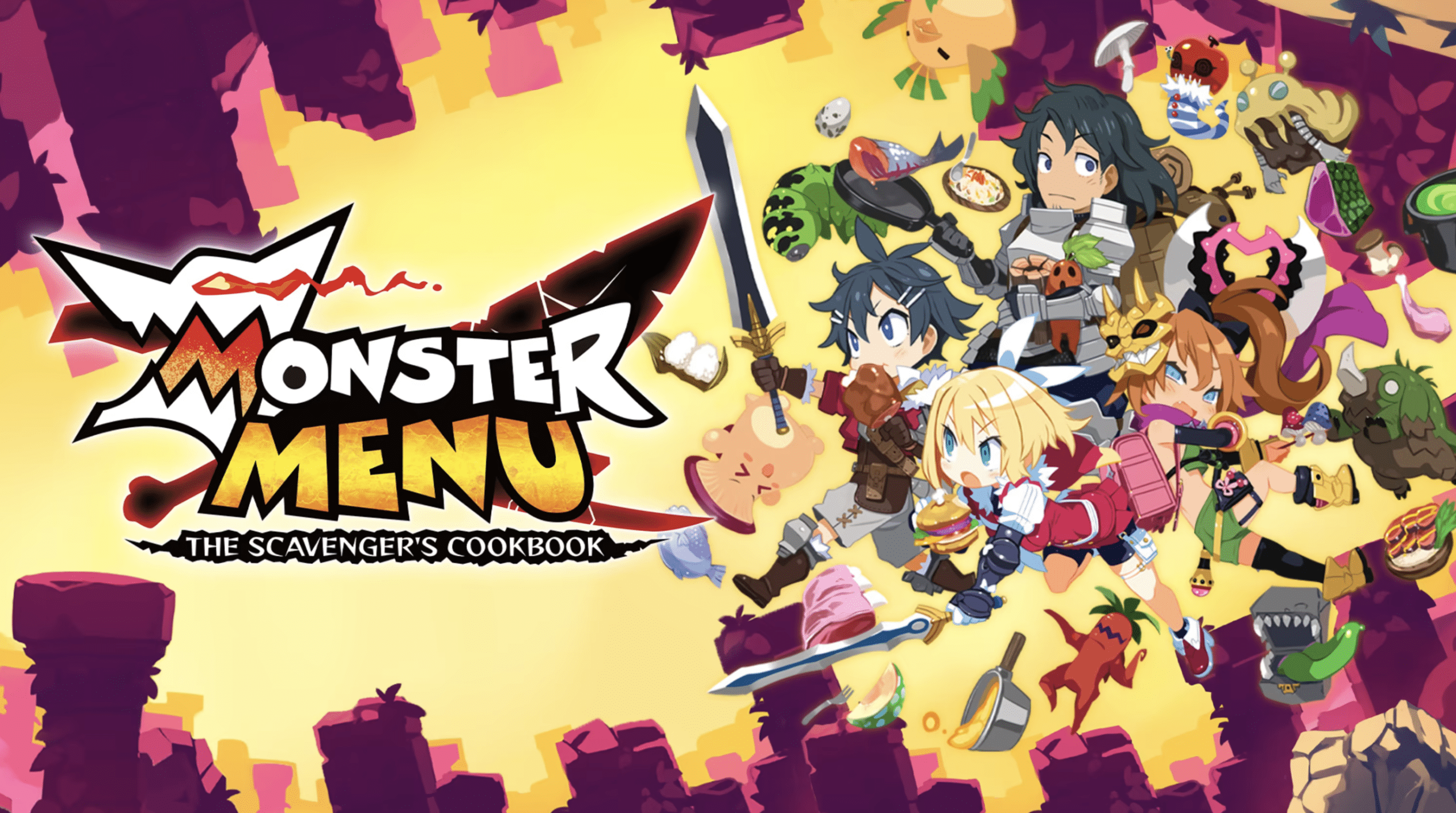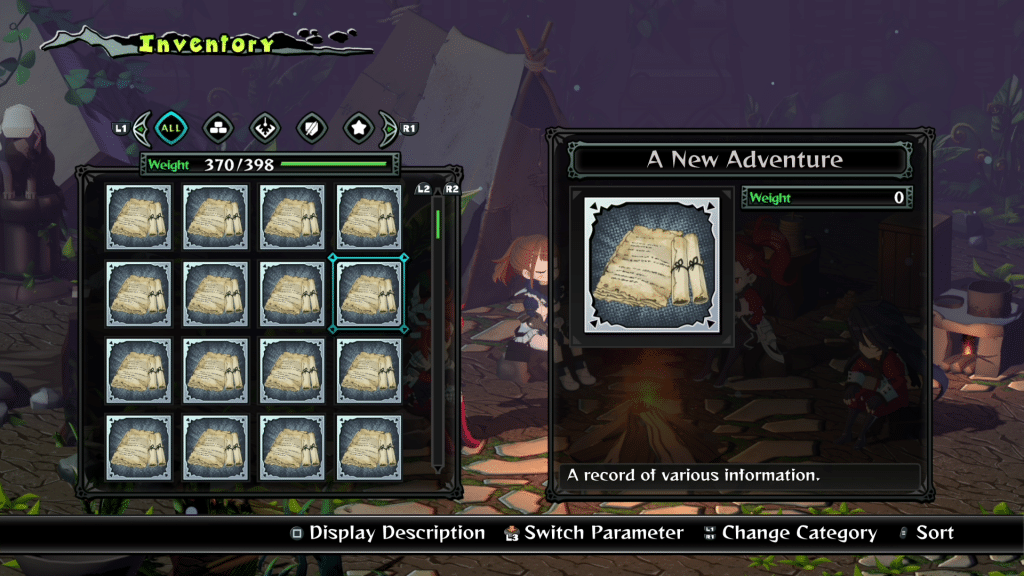

One of my favorite RPG memes deals with players never using their resources. There is always a better time to use a potion, increase your stats, eat some cheese, often resulting in these items going unused. Most games try to counter this with some kind of limit, which always gets me if it prevents opening a chest, or so difficult that these resources are actually needed. In the case of Monster Menu: The Scavenger’s Cookbook the whole experience centered around burning through your resources. It’s a novel concept, which given Nippon Ichi Software’s history of RPGs could work, but does it solve the issue, or is the food not worth the experience?
Monster Menu: The Scavenger’s Cookbook joins the ever growing list of titles that rely on environmental storytelling. After being cursed by eating part of a bug, players need to survive a 100 floor dungeon to break the curse. Beating a boss reveals something about previous adventurers, with the final boss explaining everything prior to the start of the game. Everything beyond this is located in a large number of collectibles that add context to this world. It’s a divisive choice that isn’t saved by gameplay.


At its core Monster Menu: The Scavenger’s Cookbook is a painfully generic tactical RPG. Players control up to four characters who move across a grid to defeat enemies. Combat is little more than moving or attacking, with even special attacks being underwhelming. At most you’ll position someone to attack multiple foes, hit a weaker spot, or exploit an elemental weakness.
While this can be tedious, most of Monster Menu: The Scavenger’s Cookbook will be spent on the cooking aspect. When exploring locations characters will lose calories/hydration. Literally everything has some impact on these elements as well. Cold locations burn more calories, hot locations make people thirsty faster, running uses more than walking, even fundamental concepts like moving a unit during combat has a cost associated with it. As a result, players need to collect as many resources to cook between levels if they want to survive.
This makes the first couple of hours really unenjoyable. Unless you use a recipe guide, which we will have ready on release, you’re limited to what recipes you figure out, or were blessed with through random chance. Even with these resources you’ll be unable to make a number of dishes without first repairing the various cooking utensils. All of this is extremely important to do as cooking also boosts character stats.
Every dish impacts a number of different things. Obviously this starts with healing, calories, hydration, and happiness, though better quality meals add attack, defense, speed, luck, and other such things. Failing to manage resources correctly will result in death, either through a lack of nutrition, or surviving against enemies.
As previously mentioned, Monster Menu: The Scavenger’s Cookbook is centered on the idea of using all your resources. Unfortunately, in addition to the previous stated mechanics, players are encouraged to burn through supplies. Perishables like meat slowly go bad, dying removes all your materials if you’re not playing on easy, and players will need to manage their weight.
If I’m being honest, I think it’s a neat idea. Food spoiling makes sense. The system is also somewhat logical. In addition to rare materials lasting longer, things like ores never go bad. There are also tricks to preserve food like preparing it. Where it falls short is how oppressive the system becomes.
At the point of my review I have a max weight of 398. This probably sounds like a lot, after all most materials have a weight of one, but it goes incredibly fast. For instance one of my characters is an archer who needs arrows. There are four craftable options that have a weight of either one or two per five arrows. Unless I want to maximize weight, I am best off crafting the heavier option for more damage. Even if you have a reserve of 100 shots, that is a weight of 40, or 10 percent of my total reserve.
Every piece of gear also weighs a fair amount. Simply equipping the best items in the game adds at least 15 weight per character. Giving all four characters this will bring your total to 60. Combined with my 100 arrows and that is 25 percent of my total capacity. From here a lot of weight will be used to hold ore, Repair/Enhancer Kits, different gear, and more. A lot of stages also add around 100 weight, so even under ideal circumstances I’ll need to return to base every other stage.
When returning most, if not all, food is used to create dishes that enhance your companions. Gear is disassembled, a lot of heavy resources are used/tossed, in a cycle that constantly repeats. On average I spent more time managing my resources than I did actually collecting them. Admittedly, some of this is how I play. I’m a pack rat who could stand to destroy gear I might use in favor of gear I know I will to save weight. However, it just delays the inevitable. In some cases it might even out, as someone might spend more time examining their options.
A lot of this would also be fine if Monster Menu: The Scavenger’s Cookbook didn’t have rogue-lite elements. Finishing/dying will essentially restart your adventure. Characters will return to being level one, stats obtained from dishes are removed, along with materials vanishing if you’re playing on anything besides easy. It makes the whole adventure feel like a constant hamster wheel where the only benefit is things might be easier on another run.
I say might since Monster Menu: The Scavenger’s Cookbook has an atypical approach to drops. Instead of making it so later stages guarantee higher level gear, and higher difficulties giving better versions of it, the pool simply expands. It isn’t uncommon to get multiple pieces of low level gear before getting one that is mid-tier or better. Due to this choice it isn’t uncommon to go 10 or more levels without even considering a new piece of gear. But the really unfortunate aspect is build potential.
To reach the theoretical power cap you need to first get a top tier drop. After that it needs to be gold rarity, as that determines its upgrade potential. Then it needs to drop with a high number of attributes, an amount that increases with difficulty. Finally, even if the weapon has eight, or 15 attributes, it means absolutely nothing if they aren’t good. Shields increase defense at a rate of 1 percent per level, so that 3 percent reduction against bugs on my Draconic Sword is nothing special. There is simply so much randomness it requires a massive time investment to actually get a great set of gear.
Monster Menu: The Scavenger's Cookbook: Monster Menu: The Scavenger's Cookbook is ultimately in a weird place. Gameplay is enjoyable if you like the genre, but there are so many elements that won't resonate with people. As someone who dislikes resource management those frequent sections got old very fast. For this reason I actually suggest giving the demo a go. The core gameplay loop is relatively unchanged from early and late game, so you should instantly know if this is a winner or a dud. – Grant
[Editor’s Note: Monster Menu: The Scavenger’s Cookbook was reviewed on PlayStation 5, and a copy was provided to us for review purposes.]
Ubisoft, the leading brand of video game world's leading companies, recently published the company's financial…
Warhorse Studios unveiled an overwhelming new update for its popular role-playing game, Kingdom Come: Deliverance…
Following a pre-early announcement earlier this week, Sony now officially confirmed Shift Up's extremely praised…
Sony has announced the Playstation Plus Game Catalog for May 2025, unveiling the total lineup…
WWE 2K25 just got a whole lot better as developer Visual Concepts has released patch…
Kenshi 2 has been teased, and PC players are totally excited to receive yet another…